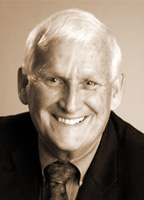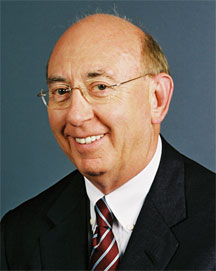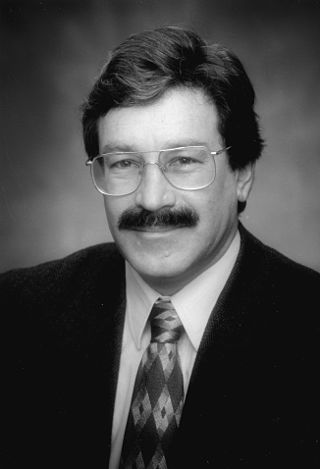Related Research Articles

Leroy "Lee" Edward Hood is an American biologist who has served on the faculties at the California Institute of Technology (Caltech) and the University of Washington. Hood has developed ground-breaking scientific instruments which made possible major advances in the biological sciences and the medical sciences. These include the first gas phase protein sequencer (1982), for determining the sequence of amino acids in a given protein; a DNA synthesizer (1983), to synthesize short sections of DNA; a peptide synthesizer (1984), to combine amino acids into longer peptides and short proteins; the first automated DNA sequencer (1986), to identify the order of nucleotides in DNA; ink-jet oligonucleotide technology for synthesizing DNA and nanostring technology for analyzing single molecules of DNA and RNA.
The National Cancer Institute (NCI) coordinates the United States National Cancer Program and is part of the National Institutes of Health (NIH), which is one of eleven agencies that are part of the U.S. Department of Health and Human Services. The NCI conducts and supports research, training, health information dissemination, and other activities related to the causes, prevention, diagnosis, and treatment of cancer; the supportive care of cancer patients and their families; and cancer survivorship.

Vincent Theodore DeVita Jr. is the Amy and Joseph Perella Professor of Medicine at Yale Cancer Center, and a Professor of Epidemiology and Public Health. He directed the Yale Cancer Center from 1993 to 2003. He has been president of the board of directors of the American Cancer Society (2012-2013). He is internationally recognized as a pioneer in the field of oncology for his work on combination-chemotherapy treatments.
Thomas Eugene Shenk is an American virologist. He is currently Emeritus Professor of Life Sciences in the Department of Molecular Biology at Princeton University.

Matthias Mann is a German physicist and biochemist. He is doing research in the area of mass spectrometry and proteomics.

George L. Blackburn was the S. Daniel Abraham Professor of Nutrition and associate director of the division of nutrition at Harvard Medical School. He was also director of the Center for the Study of Nutrition Medicine (CSNM) in the Roberta and Stephen R. Weiner Department of Surgery, and director of the new Feihe Nutrition Laboratory at Beth Israel Deaconess Medical Center (BIDMC), Boston, Massachusetts.

David B. Agus is an American physician, cancer researcher and author who serves as a professor of medicine and engineering at the University of Southern California Keck School of Medicine and Viterbi School of Engineering and the Founding Director and CEO of the Lawrence J. Ellison Institute for Transformative Medicine. He is also the cofounder of several personalized medicine companies and a contributor to CBS News on health topics. He is also the author of four books.

Edison T. Liu is an American chemist who is the former president and CEO of The Jackson Laboratory, and the former director of its NCI-designated Cancer Center (2012-2021). Before joining The Jackson Laboratory, he was the founding executive director of the Genome Institute of Singapore (GIS), chairman of the board of the Health Sciences Authority, and president of the Human Genome Organization (HUGO) (2007-2013). As the executive director of the GIS, he brought the institution to international prominence as one of the most productive genomics institutions in the world.
Joe G. N. "Skip" Garcia is an American pulmonary scientist, physician and academician.

John E. Niederhuber was the 13th director of the National Cancer Institute (NCI), from 2006 until July, 2010, succeeding Andrew von Eschenbach, who went on to become a director at biotechnology firm BioTime. A nationally renowned surgeon and researcher, Dr. Niederhuber has dedicated his four-decade career to the treatment and study of cancer - as a professor, cancer center director, National Cancer Advisory Board chair, external advisor to the NCI, grant reviewer, and laboratory investigator supported by NCI and the National Institutes of Health. He is now Executive Vice President/CEO Inova Translational Medicine Institute and Inova Health System and co-director, Johns Hopkins Clinical Research Network.

Eric D. Green is an American genomics researcher who had significant involvement in the Human Genome Project. He is the director of the National Human Genome Research Institute (NHGRI) at the National Institutes of Health (NIH), a position he has held since 2009.

George Quentin Daley is the Dean of the Faculty of Medicine, Caroline Shields Walker Professor of Medicine, and Professor of Biological Chemistry and Molecular Pharmacology at Harvard Medical School. He was formerly the Robert A. Stranahan Professor of Pediatrics at Harvard Medical School, Director of the Stem Cell Transplantation Program at Boston Children's Hospital, and an investigator of the Howard Hughes Medical Institute, Associate Director of Children's Stem Cell Program, a member of the Executive Committee of the Harvard Stem Cell Institute. He is a past president of the International Society for Stem Cell Research (2007–2008).
Robert E. Wittes was Physician-in-Chief of Memorial Sloan-Kettering Cancer Center, from 2002 until December 31, 2012. Prior to his appointment at MSKCC, he was Deputy Director for Extramural Sciences and Director of the Division of Cancer Treatment and Diagnosis at the National Cancer Institute, where he oversaw NCI's extramural clinical and basic research programs, including the evaluation of new therapeutics, diagnostics, and translational research. Wittes is a fellow of the American College of Physicians, a member of the American Association for Cancer Research, the American Society of Clinical Oncology, and the American Federation for Medical Research. In addition to his institutional affiliations, Dr. Wittes has served as editor-in-chief of the Journal of the National Cancer Institute and Oncology. He has served on the editorial boards of Clinical Cancer Research, Current Opinion in Oncology, The American Journal of Clinical Oncology; Cancer Investigation, and The International Journal of Radiation Oncology-Biology & Physics, among others.
William Douglas Figg is an American scientist (pharmacologist). He is a senior investigator (tenured) at the National Cancer Institute (NCI), National Institutes of Health (NIH), Bethesda, Maryland. He holds multiple titles within the NCI: Associate Director of the Center for Cancer Research, Co-Director of the Office of Translational Resources, Acting Branch Chief for the Genitourinary Malignancies Branch, Chief of the Clinical Pharmacology Program, and head of the Molecular Pharmacology Section. Figg is also the Co-chief of Basic Research at the Center for Prostate Disease Research within the Walter Reed National Military Medical Center – Murtha Cancer Center in Bethesda, Maryland.

The NIH Intramural Research Program (IRP) is the internal research program of the National Institutes of Health (NIH), known for its synergistic approach to biomedical science. With 1,200 Principal Investigators and over 4,000 Postdoctoral Fellows conducting basic, translational, and clinical research, the NIH Intramural Research Program is the largest biomedical research institution on earth. The unique funding environment of the IRP facilitates opportunities to conduct both long-term and high-impact science that would otherwise be difficult to undertake. With rigorous external reviews ensuring that only the most outstanding research secures funding, the IRP is responsible for many scientific accomplishments, including the discovery of fluoride to prevent tooth decay, the use of lithium to manage bipolar disorder, and the creation of vaccines against hepatitis, Hemophilus influenzae (Hib), and human papillomavirus (HPV). In addition, the IRP has also produced or trained 21 Nobel Prize-winning scientists.
Richard Dale Smith is a chemist and a Battelle Fellow and chief scientist within the biological sciences division, as well as the director of proteomics research at the Pacific Northwest National Laboratory (PNNL). Smith is also director of the NIH Proteomics Research Resource for Integrative Biology, an adjunct faculty member in the chemistry departments at Washington State University and the University of Utah, and an affiliate faculty member at the University of Idaho and the Department of Molecular Microbiology & Immunology, Oregon Health & Science University. He is the author or co-author of approximately 1100 peer-reviewed publications and has been awarded 70 US patents.

Richard D. Klausner is an American scientist who served as the 11th director of the National Cancer Institute of the United States.
Marc E. Rothenberg is an American physician-scientist who has made significant contributions to the fields of allergy, gastroenterology, and immunology. He is currently a Professor of Pediatrics, at Cincinnati Children's Hospital Medical Center, and the University of Cincinnati College of Medicine, the Director of the Division of Allergy and Immunology, the Director of the Cincinnati Center for Eosinophilic Disorders, and the principal investigator of the Consortium of Eosinophilic Disease Researchers (CEGIR) as part of the Rare Disease Clinical Research Network of the National Institute of Health. Rothenberg's research is focused on eosinophilic gastrointestinal diseases.

Worta J. McCaskill-Stevens was an American physician-scientist and medical oncologist specialized in cancer disparities research, management of comorbidities within clinical trials, and molecular research for cancer prevention interventions. She was chief of the community oncology and prevention trials research group at the National Cancer Institute.

Hynda K. Kleinman is an American cell biologist who was the chief of the cell biology section at the National Institute of Dental and Craniofacial Research from 1985 to 2006. She co-invented Matrigel.
References
- 1 2 Information, National Institutes of Health (U S. ) Division of Public (1998). NIH Almanac. U.S. Department of Health, Education and Welfare, Public Health Service, National Institutes of Health. p. 48.
- 1 2 "Lance A. Liotta". American Association for Clinical Chemistry. Retrieved 2019-12-24.
- 1 2 "CAPMM Team". Center for Applied Proteomics and Molecular Medicine. Retrieved 2019-12-24.
- ↑ Weiss, Rick (2004-06-23). "NIH Scientists Broke Rules, Panel Says". The Washington Post. ISSN 0190-8286 . Retrieved 2023-05-03.